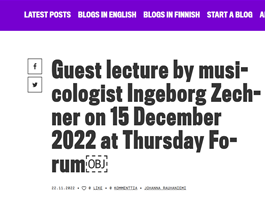Musicologist Ingeborg Zechner from the Graz University, Austria, will held the guest lecture on 15 December at 2 – 3.30 pm (Musiikkitalo`s meeting room S3101 and Zoom). The title of the lecture is What is a film musical work? Film Music Ontology in the Hollywood Movies of the 1940s.
What is a film musical work? Film Music Ontology in the Hollywood Movies of the 1940s
Music critics and film composers took an active part in the discourse about the artistic status of Hollywood’s film music in the 1940s. The vivid debate that tried to overcome film music’s derogatory status as “wallpaper” or “unheard” contained important ontological arguments that negotiated the specific nature of film music as an audiovisual art form before the background of the normative historiographical framework of art music.
I will show that an ontological debate about film music – medially situated between art and popular music – enfolded also in the films themselves and can be connected to the contemporary practice of concert adaptations of film music. It is exactly this ontological perspective that provides a novel level of understanding of film music in the 1940s in a historical context that goes beyond its commonly acknowledged narrative function without neglecting it. The negotiation of ontological aspects of film music is especially eminent in movies that featured fictional concert compositions with the real composer in disguise, such asFour Wives (1939, music by Max Steiner), Hangover Square (1945, music by Bernard Herrmann), The Constant Nymph and Deception (1943 and 1946, both with music by Erich Wolfgang Korngold), Night Song (1948, music by Leith Stevens), or The Paradine Case and Humoresque (1947 and 1946, both with music by Franz Waxman). I will analyze different ontological categories (such as collaboration, medial transfers, ephemerality, notation) that have been extracted from the contemporary discourse on film music with selected examples from these movies and connect them with the practice of concert adaptations. I will furthermore demonstrate how these films deal with them as an additional layer in their distinct narratives.
Pre-registration for Zoom is required. Register is open until 9 December 2022
